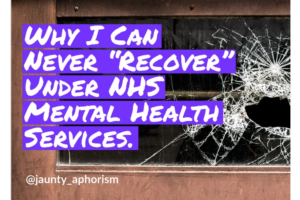From Psychiatry Is Driving Me Mad: “The powers often talked about in mental health services are the restrictive powers, such as sectioning/detaining, forced medication, sedation, seclusion, loss of liberty and autonomy etc. The powers less commonly discussed by professionals; the power to overwrite and redefine your own experiences; the power to use psychological and psychiatric theory to recreate a version of you they feel fits their own narrative; the power to share information about you without your knowledge or consent; the power to decide what parts of you are broken and in need of fixing; the power to decide that you are officially ‘dysfunctional’ and not ‘normal’; the power to withhold care and ignore you; the power to use their feelings as proof of your dysfunction; the power to entirely discredit you in the eyes of society; the power to completely obliterate who you actually are… can be just as devastating. You don’t need to be detained, secluded, or sedated to feel trapped by mental health services. They don’t even need to touch you for you to know the whole of your being is under their control.
The element of services I find most challenging is the fact that every moment of every interaction is a chance for staff to judge, record, and diagnose you… over and over again. Every single thing you do and say in their presence contributes to your ‘paper-self’: making any and all interactions exhausting, because even one moment of annoyance or frustration or anger or despair, or just misspeaking, can tarnish your entire future under services. It is exactly like being in an abusive relationship – watching your every word, ensuring every action is calculated to keep the other person happy. Knowing if you slip up, you’ll be made to pay. You might get a flag on your notes/address stating you are aggressive, which you can’t remove for years, if ever; you might get a new formulation or diagnosis without your consent or knowledge; you might end up the subject of an MDT where your whole being is torn to shreds by an entire room of people who weren’t even present at the time of the ‘incident’; you might be discharged when you don’t want to be, or not discharged when you should have been; you might have your medication changed without discussion; you might have ‘privileges’, such as reasonable adjustments, removed… No matter what it was that happened, it’s never just passed by without consequences. I expressed some frustration to my psychiatrist in an appointment once, and in the letter to my GP he wrote that I was being ‘challenging’ and ‘difficult’. In every single letter since then, my conduct is compared to that one appointment, with either a comment that I am ‘less challenging’ or ‘similarly challenging’ etc… That one single appointment, one of hundreds of appointments, in which I didn’t swear or leap around or threaten anyone, but merely told my psychiatrist over the phone that he was paternalistic, follows me everywhere. I had a course of psychotherapy years ago, and although I attended every single appointment without issue, I got a flag in my notes that I was uncooperative and at risk of ‘unplanned disengagement’ because I missed my final appointment. Five years ago, I was assaulted in a pub, and responded by pushing the person. After recounting this extremely distressing story to a psychologist, my risk assessments have since included ‘risk of aggressive behaviour’. No context, nothing to explain to staff that the apparent ‘aggressive behaviour’ was self-defense, nothing at all but that. I have subsequently experienced staff wanting to risk assess my appointments with them to ensure their own safety.
It’s hard to describe how it feels to be on the losing end of this power dynamic, to be in this situation continuously. It’s like being under surveillance. Nothing is ever forgotten, nothing is ever considered in context. You will be reminded of your failure to be ‘good’ forever. It replicates an abusive dynamic, which so many people under mental health services will have a lot of experience with. I have found it more and more unbearable, the more I interact with services, the more I feel it. Feeling as if I am completely unsafe, needing to control everything about myself to make sure I don’t do anything wrong, so that I can’t be punished. It’s overwhelming. It has completely destroyed any chance I had of being able to make any form of progress. For all intents and purposes, while under services, I am back being abused, and my mind and body react accordingly; screaming ‘BE A GOOD GIRL’ in every interaction I have with staff; screaming ‘RUN’ whenever I see an opportunity to escape; screaming ‘SOMETHING IS WRONG’ all the time…
I cannot ‘recover’ in this environment. I can only continue to try and remain safe, while hoping to survive it.”

***
Back to Around the Web











